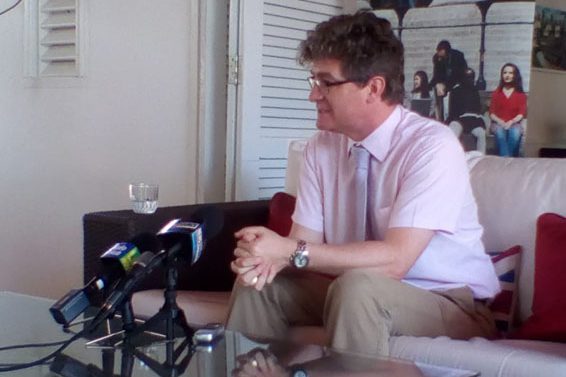Even as British High Commissioner to Guyana, Gregory Quinn acknowledged that conditional cash payouts can be beneficial to Guyanese he has stressed that infrastructure should be priority.
“I still think [the] number one priority has to be infrastructure and then people will see that benefit just as quickly and more sustainably than if they were just given cash,” he told reporters during a press conference at his residence yesterday.
According to Quinn, though cash payouts are an interesting idea and he has seen the arguments of both sides, if he were in the position and knew the oil money was coming “then the first sort of things I’d want to be doing is the infrastructure; that’s the roads, that’s the ports, that’s the schools, that’s the hospitals all of that sort of stuff.”
He stressed that he can understand the arguments but noted that rather than give citizens US$5,000 to spend on anything it might be better to consider giving them cash with conditions, such as capital to set up a business so they can use it to build self-sufficiency.
The idea of a cash payout to citizens from oil revenues has been a hotly debated topic since economist Dr Clive Thomas repeated his suggestion earlier this month. He had first mentioned it in June at a Moray House Trust discussion.
“Whether it be US$5,000 per year or whatever it works out at, we can put the figure together – there must be a mechanism in place to ensure every single household and by extension every single person, sees the benefits of oil and gas in terms of cash or cheque received in their accounts,” Thomas said at an event organized by the Buxton First of August Movement.
While addressing those gathered at the Friendship, East Coast Demerara Primary School, Thomas said, “I believe that some portion of the net cash flow from oil should be dedicated and be given as cash transfers to every single household in this country….”
He had contended that regardless of what multilateral agencies may advise, Guyanese must pressure the government to tap monetary rewards from oil revenues if the country wants to have true equity and see a real lowering of poverty. He made it clear that he does not see a disbursement of cash transfers to the populace as a waste of money.
His party, the Working People’s Alliance (WPA) has since rallied behind the suggestion but the Justice For All Party (JFAP), which along with the WPA is a member of A Partnership for National Unity (APNU), has not.
Leader of the JFAP Jaipaul Sharma told Stabroek News that he is convinced that the suggestion from the WPA that oil revenues should be used for cash payouts to every Guyanese must be an election gimmick as he argued it is not based on sound economic theory.
“It was an irresponsible statement to make and I can’t believe that Dr. (Clive) Thomas is an irresponsible man. He is an economist. He must have been encouraged by someone else in his party to make that statement, to give the people false hope like that. You can’t raise people expectations and not give them structure,” Sharma, who is also the Minister within the Ministry of Finance, said in an invited comment.
Minister of Finance Winston Jordan has expressed similar concerns noting it will be up to Cabinet to decide and even then there has to be a clear structure of how it could be implemented.
“Conditional cash transfer is not new to Guyana. We did it in several places, even when I was small. There may be things to it. On the other side, I must admit to you I would have a difficulty if Cabinet were to agree to it and in the implementation it wasn’t properly structured. For example, rather than just giving people US$5,000 a year, why not look at issues such as education, health, youth programmes, small businesses… teaching a man to fish and then he could do it for a lifetime, rather than giving him a fish when he could only feed himself for a short while. I would rather hear more debate talking about using our resources to create opportunities for people so that they themselves can have lasting incomes. Because money that you are giving out will soon end and you would have pitched your lifestyle to the level of the money you receiving, and when you can no longer give that money, then what is going to happen?” he had questioned.






